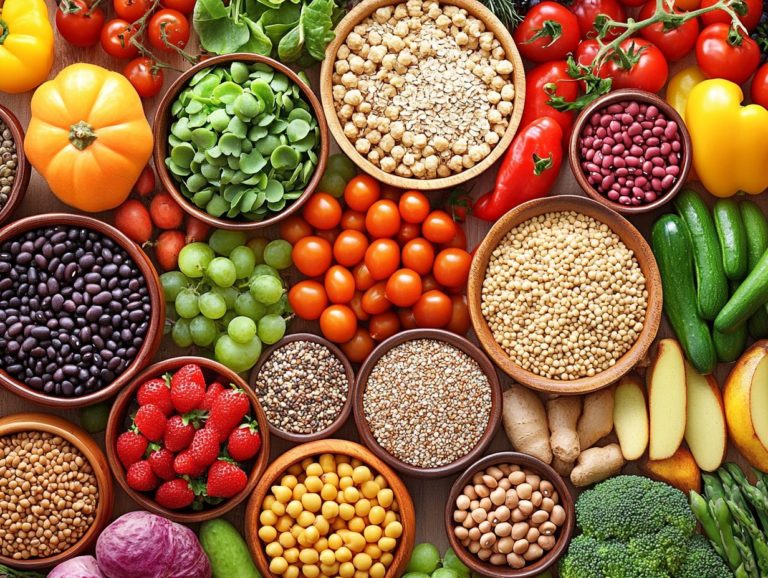What Foods Are Essential in Holistic Nutrition?
Holistic nutrition transcends the mere act of counting calories or adhering to the latest diet fads. It embraces a comprehensive method to health that considers you as a whole body, mind, and spirit.
Join this exciting journey and discover how holistic nutrition can dramatically boost your well-being! This exploration delves into the core principles of holistic nutrition, emphasizing the importance of essential foods and their nutrients. You ll discover practical tips for incorporating these foods into your daily meals, along with a thoughtful discussion of the myriad benefits this approach offers, as well as potential drawbacks to remain mindful of.
Contents
- Key Takeaways:
- Understanding Holistic Nutrition
- The Role of Essential Foods in Holistic Nutrition
- Incorporating Essential Foods into Your Diet
- Benefits of a Nutrition Approach That Considers the Whole Person
- Potential Drawbacks of Holistic Nutrition
- Frequently Asked Questions
- What Foods Are Essential in Holistic Nutrition?
- What are the benefits of incorporating these foods into a holistic nutrition approach?
- Can I still enjoy my favorite foods while following a holistic nutrition approach?
- Are there any foods to avoid in a holistic nutrition approach?
- Do I need to follow a specific diet or eliminate food groups for a holistic nutrition approach?
- Is it possible to get all the necessary nutrients from a holistic nutrition approach?
Key Takeaways:
- Eating a variety of nutrient-dense foods those that provide a lot of nutrients without many calories is essential for a holistic approach to nutrition.
- Essential foods provide necessary nutrients that support overall health and well-being.
- Meal planning can help you incorporate these essential foods into your diet, leading to a balanced and sustainable way of eating.
Understanding Holistic Nutrition
Understanding holistic nutrition means looking at your diet as a whole. It invites you to appreciate the intricate connections between body, mind, and spirit, while recognizing how your dietary choices profoundly impact your overall health and well-being. Exploring the role of supplements in holistic nutrition can further enhance this understanding.
This approach places a premium on nourishing foods, think wild-caught salmon and dark leafy greens that deliver essential nutrients and cultivate a positive relationship with what you eat. Embracing a holistic diet means incorporating organic options, gluten-free selections for those with Celiac Disease, and understanding the science behind holistic nutrition—nutrient-dense foods brimming with omega-3 fatty acids and antioxidants.
These choices are vital for managing stress and enhancing emotional stability, guiding you toward a more harmonious lifestyle.
Defining the Concept
Holistic nutrition means looking at your diet as a whole. It takes into account the whole person, rather than merely focusing on individual nutrients or food groups, including understanding the role of fiber in holistic nutrition.
By embracing this philosophy, you can cultivate a deeper understanding of how essential nutrients interact within your body to promote optimal wellness. This includes appreciating the importance of food labels, which offer vital information to guide you in making informed dietary choices, ensuring that what you consume aligns with your health goals.
The right cooking techniques are also pivotal in enhancing nutrient absorption, enabling you to maximize the benefits of the foods you eat. Ultimately, holistic nutrition nurtures your body and fosters a mindful relationship with food, supporting your physical, mental, and emotional well-being.
The Role of Essential Foods in Holistic Nutrition
Essential foods are fundamental to your holistic nutrition journey. They supply your body with the vital nutrients it needs for optimal functioning, but it’s also important to know what foods to avoid in holistic nutrition for overall well-being.
Nutrients and Benefits of Essential Foods
The nutrients you find in essential foods such as vitamins, minerals, and antioxidants are crucial for maintaining your health and preventing disease.
These nutrients are vital for your body s functions. For instance, vitamins C and D boost your immunity and enhance your defenses against pesky pathogens. Essential foods are also packed with fiber, which aids digestion and nurtures your gut microbiome by encouraging the growth of beneficial bacteria. This diverse community of microbes is essential for regulating blood sugar levels, as fiber helps slow down sugar absorption into your bloodstream.
Antioxidants found in fruits and vegetables are your allies in the battle against oxidative stress. They promote overall well-being and lower the risk of chronic diseases.
Incorporating Essential Foods into Your Diet
Incorporating essential foods into your diet requires careful meal planning and a solid grasp of cooking techniques that maintain their nutritional integrity. By prioritizing these elements, you can elevate your meals and fully harness the benefits of the ingredients you choose.
Tips for Meal Planning and Preparation
Effective meal planning and preparation can greatly enhance how you incorporate healthy foods and essential nutrients into your daily routine.
Create exciting food rituals! Gather with loved ones for a weekly meal prep session or dedicate Sundays to explore new recipes. By focusing on a diverse range of food options, you ensure that you’re not only nourished but also treated to a delightful array of flavors and textures, making each meal a culinary adventure.
Experimenting with various cooking techniques like steaming, roasting, or saut ing can further boost nutrient absorption, allowing your body to fully reap the benefits of those vital vitamins and minerals.
Benefits of a Nutrition Approach That Considers the Whole Person
Embracing a nutrition approach that considers the whole person offers a wealth of benefits, profoundly enhancing your overall health, emotional balance, and stress management.
Improving Overall Health and Well-being
Improving your overall health and well-being is a fundamental goal of this nutrition approach. This strategy not only addresses lack of nutrients but also emphasizes the importance of health-promoting foods.
By incorporating a diverse array of whole foods think vibrant fruits, leafy greens, and wholesome grains you can effectively nourish your body. This philosophy encourages you to include healthy fats from sources like avocados and nuts, which are essential for brain health and emotional balance.
Practicing mindfulness in your eating habits and being aware of how different foods influence your mood and energy levels fosters a deeper connection to your physical and emotional states.
By adopting strategies such as meal prepping and opting for organic choices, maintaining consistency becomes easier, enabling you to make better nutritional decisions that pave the way for enhanced vitality.
Potential Drawbacks of Holistic Nutrition
While holistic nutrition presents a wealth of benefits, it’s essential to consider the potential drawbacks and limitations that may arise when making your dietary choices.
Considerations and Limitations
When you consider a holistic nutrition approach, it s crucial to recognize the limitations and challenges you may encounter in your dietary choices.
Challenges can come from personal factors like time limits and cooking skills, as well as cultural influences that shape your food preferences and access to traditional ingredients. Economic factors also play a significant role, often defining what you can afford and further narrowing your options.
Fortunately, community initiatives can offer you valuable support through local farmers’ markets, educational workshops, and food co-ops. These resources enable you to make informed dietary decisions. By fostering collaboration and sharing resources, these initiatives work hard to break down barriers and ensure everyone has access to nutritious food options, helping to build vibrant, healthier communities together!
Frequently Asked Questions
What Foods Are Essential in Holistic Nutrition?
Holistic nutrition focuses on nourishing the body with whole, natural foods. Understanding what role whole foods play in holistic nutrition is key. Some essential foods to include in this approach to eating include:
- Fresh fruits and vegetables: These provide important vitamins, minerals, and antioxidants for overall health.
- Whole grains: Choose whole grain options such as brown rice, quinoa, and oats for fiber and sustained energy.
- Healthy fats: Incorporate sources of healthy fats such as avocados, nuts and seeds, and olive oil for heart health and satiety.
- Lean proteins: Protein is essential for building and repairing tissues and can be found in foods like beans, lentils, tofu, and lean meats.
- Fermented foods: These include foods like yogurt, kimchi, and sauerkraut which contain probiotics that support gut health.
- Herbs and spices: These add flavor to meals without extra salt and can have anti-inflammatory and detoxifying properties.
What are the benefits of incorporating these foods into a holistic nutrition approach?
Including essential foods in your diet improves overall health and well-being. Fresh fruits and vegetables are packed with vitamins, minerals, and antioxidants that protect against chronic diseases.
Whole grains provide sustained energy and support digestive health. Healthy fats are crucial for heart health and keep you feeling full.
Lean proteins help build and repair tissues. Fermented foods support a healthy gut and immune system. Herbs and spices also have anti-inflammatory properties.
Can I still enjoy my favorite foods while following a holistic nutrition approach?
Yes! A holistic nutrition approach is not about strict rules or deprivation. It s about adding whole, natural foods to your diet while enjoying your favorite treats in moderation.
Are there any foods to avoid in a holistic nutrition approach?
No strict rules apply, but it’s advisable to limit processed foods. These often lack vital nutrients and can increase inflammation.
Listen to your body and steer clear of foods that cause discomfort.
Do I need to follow a specific diet or eliminate food groups for a holistic nutrition approach?
No specific diet is necessary. This approach focuses on listening to your body and making nourishing choices that cater to your mind, body, and spirit.
Is it possible to get all the necessary nutrients from a holistic nutrition approach?
Absolutely! By including a variety of whole foods, you can meet all your nutrient needs. Choose colorful fruits and vegetables, and vary your protein, whole grain, and healthy fat sources.






